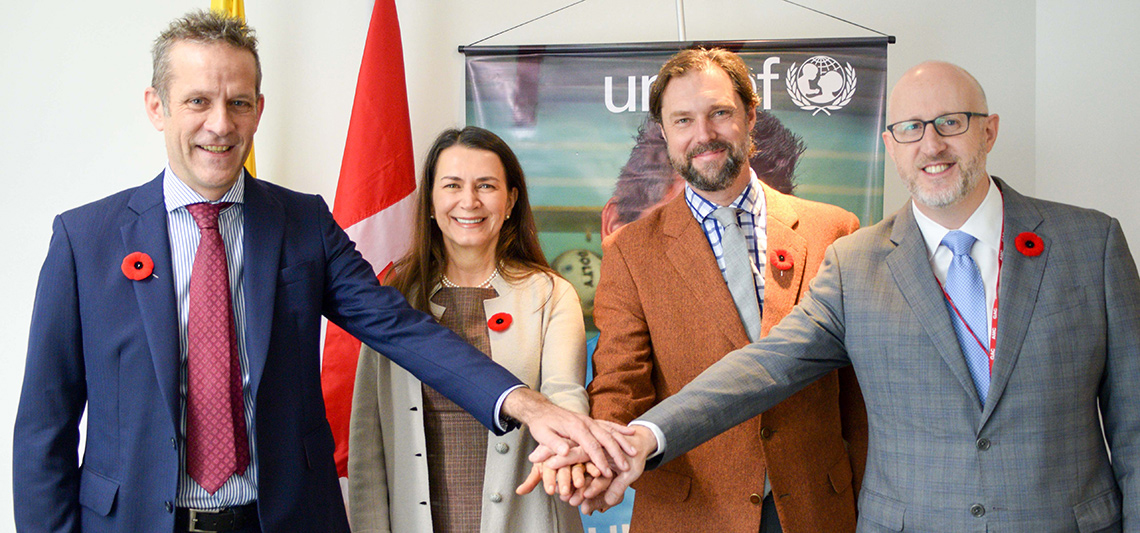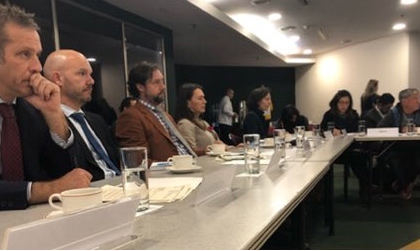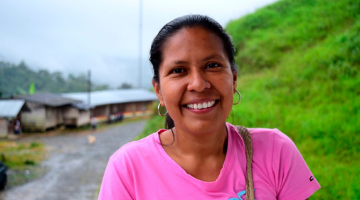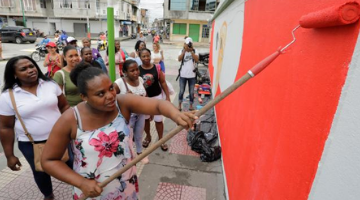The chance to be a kid: protecting Colombian children in armed conflict
Canada in Colombia
Children
December, 2018
Photo: Mercy Corps
Children deserve a life free of violence. The Embassy of Canada to Colombia is working to make that a reality.
Laughing with friends. Running around the soccer field. Learning in school.
These are the activities that occupy most children’s time.
But for children in conflict zones, carefree days of neighbourhood games are just a dream.
Instead, they live with the threat of being forced from their homes, separated from their family or abducted. Children routinely get caught in the crossfire of armed violence, become disabled as a result of explosive devices and are targets of rape and sexual violence.
Some armed groups even force kids to be child soldiers.
Police forces and community watch groups that would have offered protection tend to fall apart during conflict, making boys and girls even more vulnerable.
All of this in addition to the psychological trauma that comes with living in a conflict zone, interruptions to their education and loss of family members and friends.
That’s why the Embassy of Canada to Colombia is taking action.
Ongoing risks in Colombia
Colombia’s 50-year internal conflict with the Revolutionary Armed Forces of Colombia’s People’s Army (FARC-EP) officially ended in 2016 when they signed a peace agreement with the Colombian government.
But a 2018 United Nations Report of the Secretary-General indicates that children are still at risk.
In 2017, children were still being recruited by the Ejército de Liberación Nacional (ELN) and various illegal armed groups. They are injured by shooting, crossfire or explosive devices. They are abducted or even killed, and there have been too many cases of rape and other sexual violence.
While the FARC-EP did not recruit any new child soldiers in 2017 and many child soldiers have been released into government care, much progress remains to ensure a safe environment for Colombian children.
To raise awareness of the ongoing threats facing boys and girls in the country, the Embassy of Canada to Colombia hosted members of civil society and the international community to discuss the situation and how to help.
Children on the Venezuela-Colombia border
Several non-governmental organizations and international partners raised concern for the safety of children as Venezuelans flee their homes for Colombia.
Venezuela’s ongoing crisis has forced many to leave their homes in search of food, health care, other basic services and new opportunities.
Recently, the number of unaccompanied Venezuelan children in the region has increased. These children often suffer from undernutrition or malnutrition, and face significant health and safety risks.
The government is unable to improve this situation, which is itself aggravated by the dangerous conditions already existing at the border with illegal armed groups, illicit economies and high poverty rates.
With nowhere else to turn, desperate children are incredibly vulnerable to recruitment and exploitation by illegal armed groups.

Canadian Ambassador Marcel Lebleu, Viviana Limpias (Deputy Representative, UNICEF Colombia), Pontus Ohrstedt (Head of the Resident Coordinator's Office, UN Colombia) and Michael Grant (Assistant Deputy Minister, Global Affairs Canada)
Taking action with the “Group of Friends”
The Embassy of Canada to Colombia hosted this discussion among the “Group of Friends of Resolution 1612”.
The United Nations Security Council (UNSC) Resolution 1612 condemns the use of children in conflicts and calls for the monitoring and reporting of the status of children in armed conflict zones.
Since 2009, Canada has co-chaired the “Group of Friends” which includes UNICEF, other embassies and local non-governmental organizations who advocate for continued international attention, dialogue and action on this issue.
And that’s exactly what Canada is doing.
 Canada hosts a discussion with international partners and non-governmental organizations about the safety of children in Colombia.
Canada hosts a discussion with international partners and non-governmental organizations about the safety of children in Colombia.Justice for kids
The Canadian embassy took the opportunity amid the “Group of Friends” to announce a new project supporting Colombian boys and girls.
In partnership with UNICEF, the project will strengthen the national Special Jurisdiction for Peace (JEP) by integrating a child-friendly and gender-sensitive approach to justice.
The Special Jurisdiction for Peace is one of the three pillars of the “Comprehensive System of Truth, Justice, Reparation and non-Repetition” established as part of Colombia’s Peace Agreement of 2016, which called for the creation of a transitional justice system. The emphasis of this comprehensive system is to offer restorative and reparative measures to the victims of conflict.
Through the Peace and Stabilization Operations Program (PSOPs), UNICEF will offer technical assistance to the JEP regarding different factors to take into account when analyzing the impact of armed conflict on children. The training will also be extended to the national Truth Commission and other civil society organizations working on this issue in Colombia.
The project will ensure boys and girls who have been victims of armed conflict receive the justice they deserve.
A safer, brighter future
These initiatives are just part of Canada’s work protecting Colombian boys and girls.
Canada had dedicated $65.7 million in funding for four key projects supporting Colombian children and youth affected by conflict.
Alongside partners, these projects create safe schools and communities for vulnerable youth; improve access to quality education; provide comprehensive sexual and reproductive health education; and strengthen the capacity of the government to protect and compensate victims of armed conflict, including boys and girls.
From learning in a classroom to learning peace through sport, our programs are helping build lasting peace in Colombia so children can live a life free from violence, insecurity and fear.
So that kids have the chance to be kids.
Related Links
External resources
2018 United Nations Report of the Secretary-General
- Date Modified:



